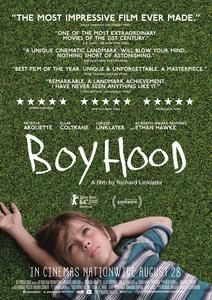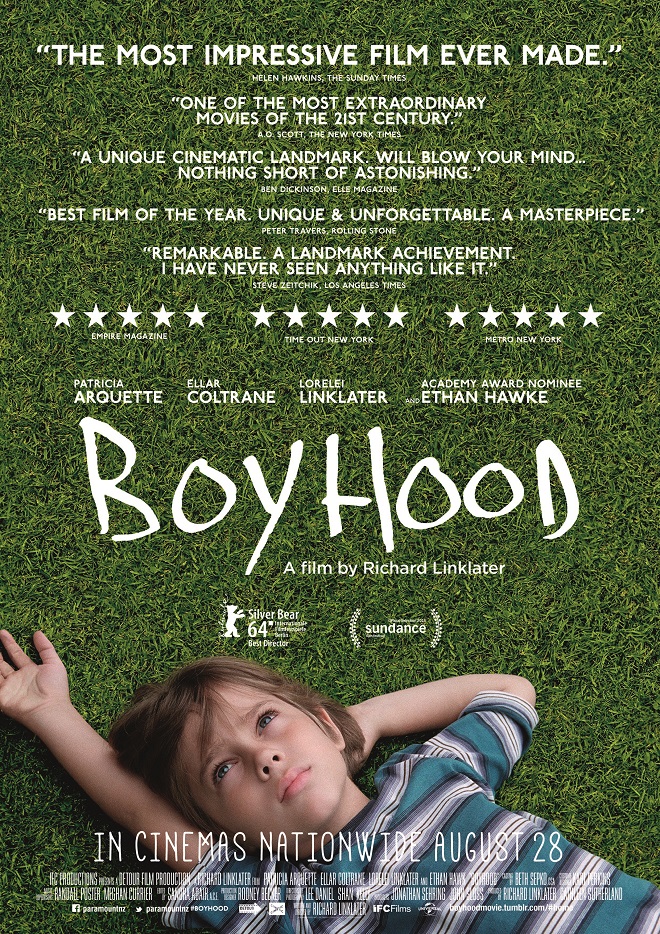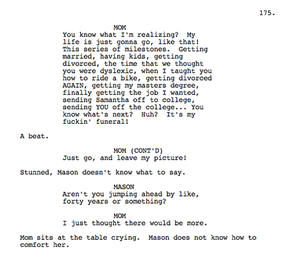 It’s not unusual that I disagree with some movie critics. It is unusual that I disagree with, apparently, ALL of them.
It’s not unusual that I disagree with some movie critics. It is unusual that I disagree with, apparently, ALL of them.
And I have to speak out, because Boyhood won the Golden Globe last night for Best Dramatic Film, and many consider it an Oscar contender.
For those not aware, Boyhood is the latest from writer-director Richard Linklater. It was filmed over the course of 12 years. Unlike Michael Apted’s “Up” series (documentaries checking in with the same people every seven years) or Linklater’s “Before” trilogy (following the same characters every eight or nine years), Boyhood filmed a little bit with its cast for more than a decade. We don’t just meet Mason (Ellar Coltrane) as an elementary schooler. We see his voice change and watch his rites of passage, like sucking at bumper-free bowling, peer pressure to drink and lying about his sexual experience. We see him trying to find himself, which is not as exciting as it sounds.
Filming a slice-of-life movie over the course of 12 years — it is a film endeavor grand in scale yet tiny in scope.
It is also…. quite bad.
Much of the praise is about the making of the film itself. I won’t call the use of the same-actors-over-time a “gimmick” – it is not. It is innovative and clever. And it might have made for a good movie in the end. But it didn’t. You see, when Ellar Coltrane was 5 years old Linklater chose him as his star. Linklater was banking that Ellar (as Mason) would develop into an interesting, expressive and verbal person. He also chose his daughter Lorelei (as Mason’s sister Samantha) as the co-star – hoping as well that she – growing up in Linklater’s film world – would learn how to act or at least be interesting (since a great deal of the dialogue was to be improvised). Unfortunately for Linklater, Ellar and Lorelei are not fascinating to look at and have little to contribute to the scenes. Ellar hides behind a flop of hair over his face. As he grows older and taller, he hunches over and tries to hide himself. And Lorelei, particular in the later scenes, looks like she would rather be anywhere than on her dad’s movie set.
Despite Linklater’s hopes, Ellar grew up to be rather bland (thanks to homeschooling in real life, I would say), so what the film ends up being was an almost-three-hour portrayal of a very boring child maturing into an introverted and kind of surly young man. It’s like watching paint dry, and then coming back every year to see it dry even more.
Throughout the film, Ellar’s character, Mason, experiences minimal joy, sadness or surprise. Perhaps that’s because Linklater wants to show that our lives are made up of the mundane, not the peaks and valleys. That may be true, but when charting significant experiences between 6 and 18, it’s ridiculous not to include the most resonating sorrow and elation that shape who we become. Linklater seems to be saying, “Hey, the characters go through no arc here”. Okay, but that means that we’re just watching staged home movies of non-events. For three hours.
And even when the film tries to introduce a little bit of drama and plot — like when Mason’s mom marries a college professor who turns out to be an abusive, alcoholic jerk — Boyhood becomes cartoonishly melodramatic. In those moments, it feels like the work of a freshman film student.
Don’t get me wrong — it is fun to watch Mason and his sister grow physically from scene to scene. It’s fun to watch Mason’s mom (Patricia Arquette) ride the rollercoaster of weight gain and weight loss over the course of twelve years. But that’s not a movie.
You get the sense, as the project was ending, that the director and actors knew they had a dull movie on their hands, and were striving to find the narrative — the glue that held the whole thing together. You can imagine them sitting around the table and suddenly realizing that the movie is disjointed and just a bunch of random scenes. “Wait!” someone perks up “Maybe that’s what we are trying to say! That life is just a series of mundane unrelated moments“. And so, towards the end of the movie, you get father-son scenes between Ethan Hawke (Dad) and Ellar Coltrane (Mason) where father says to son that life is just a bunch of improvised moments that you make up as you go along and there is no big answer or theme or mystery.
Well, maybe the movie is that way, but no, life isn’t that way. MOST of it might be, but even as children we are occasionally faced with events that shape us. There is an arc to all of our stories. It just might not be an interesting one.
It certainly wasn’t an interesting one in Boyhood.
The one moment I liked was this: in one scene, the mom praises a helpful Puerto Rican worker who has been fixing a leaking water pipe. “You’re very smart,” she tells him and urges him to go to community college to learn (among other things) English as a second language. It’s a throwaway line in a throwaway scene, said to one of dozens of throwaway characters who appear in the movie. Years later, the same Puerto Rican character appears again, this time as the manager of his own restaurant in which the mom is eating. He comes up to her, introduces himself (“You don’t remember me but….”) and explains how he took her advice, and she changed his life. Now that was pretty cool — how we all have the potential to touch and effect each other, even in small random ways. I wish we had followed that minor character’s story. It would have been far more entertaining.
UPDATE: Here’s a page from the script of Boyhood, and it’s the mom’s big scene in which she sums up her life. And she closes by saying, “I just thought there would be more.”
Indeed.


